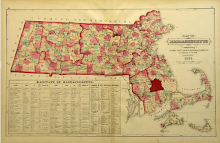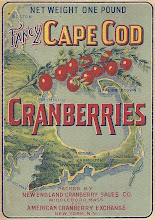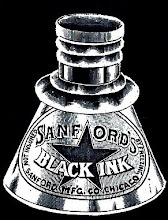 |
"Simple Milk Loaf", photograph, April 9, 2009,by juanelos. Reused under a Creative Commons license. |
Fittingly, the Peirce Street bakery, which was to be so troubled with problems, had its origin in the misfortune of another bakery - the Wareham Street bakery- which went up in flames in December, 1857, taking with it for good measure, the nearby dwelling house of Abial Gibbs as well as Gibbs' barn which housed the Middleborough and Plymouth stage line.
Because the Wareham Street bakery had been what would have been termed in those days "a going proposition" (generating some $10,000 annually), the incentive for a go-getum entrepreneur to build a new bakery was great.
Accordingly, in January, 1858, Eleazer Richmond began construction of a new bakery with brick foundation on Peirce Street, a location close enough to the Four Corners to take advantage of the growing number of residents requiring baked goods, but far enough removed as to minimize the threat of fire to the entire village (always a concern with bakeries).
The bakery commenced operations at the start of April under the direction of George H. Everett, the unfortunate last proprietor of the Wareham Street bakery, and its opening was heralded with an announcement and advertisement in the pages of the Gazette. As a courtesy, Everett (operating under the assumption that "you can't buy advertising like that") sent the Gazette "crackers, gingerbread and cakes hot from the new oven and good as we could imagine."
The abeyance of Everett's troubles following the Wareham Street fire, however, did not last long. In late May, 1858, the apprentice he had engaged for the new bakery absconded one Sunday evening with $60 worth of clothing and money, a sum representing some 2 to 3 days' receipts for the bakery.
Apparently, the Peirce Street bakery wasn't as "going" a proposition as its predecessor. Money became tight, and Everett was compelled to shut down operations for what was described as a "lack of funds." Truly, it was a lack of patronage which closed the bakery as indicated by the Gazette's own somewhat circular contention that "there is patronage enough in Middleboro and vicinity to support it well, if bestowed in that direction.
No money was forthcoming, no patronage bestowed, and in September, William B. Smith took charge of the bakery. Again, the Gazette (purely for the sake of journalistic accuracy) felt compelled to sample the bakery products. "Having tried Mr. Smith's bread we pronounce it first rate."
The community didn't agree with this assessment and, within months, Smith was gone.
 |
Map of Plymouth County, H. F. Walling, c. 1857, detail showing the location of the Peirce Street bakery circled. |
In May, 1860, a third baker, N. C. Hunt, decided to try his hand at running the bakery, and the Gazette pronounced (after still yet another sampling) that the bakery's products were fit for Queen Victoria "or any of her darling daughters." (The bakery's problems not withstanding, at least the Gazette staff was well-fed).
Hunt had no more success than the others, and charge of the bakery operation was taken by Henri Johnson who, in April, 1861, formed a partnership with grocer James Harlow to continue the business. "They intend to furnish the best bread, crackers, pies and cakes, for their patrons."
In mid-November, 1861, Johnson engaged a new baker and announced his readiness to supply the community with brown, white and graham bread. "Particular attention will be paid to the baking of beans and pudding if left at the bake house by eight o'clock, Saturday evenings."
Despite the Gazette's encouragement (it considered the maintenance of a bakery in Middleborough of supreme importance), the Peirce Street bakery was never a successful operation. It was not until the eventual arrival of Samuel S. Bourne that the town was able to sustain a commercial bakery.
The Peirce Street bakery ultimately folded operations, and by 1872 when the property was mortgaged, the bakery building had been converted into a dwelling house, a use it has maintained ever since.






















+of+Smoky+Mountains+018.jpg)
0 comments:
Post a Comment